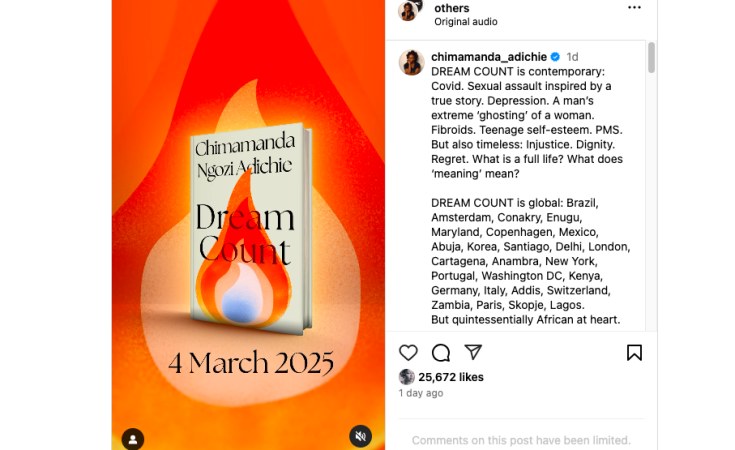"When children read storybooks consistently, they're learning without even knowing that they're learning."
Nigerian-born and award-winning writer, Chimamanda Adichie, has called for more African stories to help preserve the continent's heritage, history and development.
According to her, stories are integral to development as they encompass the total essence of a people and their worldview. She said they impact positively on psychology, education, politics and more.
Adichie spoke at the launch of CANEX Book Factory and Prize for Publishing in Africa, held during the Creative Africa Nexus (CANEX) Summit on Thursday, at the hybrid Intra African Trade Fair 2023 being held in Cairo, Egypt, from Nov. 9 to Nov. 15.
She said: "We need more stories on this continent because we need to reclaim our histories. We need stories because stories are very much part of development.
"Our continent has so often been sidelined and maligned, and while there has been some change, there is still altogether too much patronising and too much pity directed at this continent.
"And it must be said that there are also a few Africans who by their actions, enable the state of affairs.
"If we reclaim our histories, it will give us the confidence that comes from knowing who we are, we need more stories so that we can turn our myths into memory."
According to her, today, African children go to elite boarding schools in different parts of the world, and they learn about Greek mythology.
"But what is the difference between Persephone, the Greek goddess of planting seeds, and Ala, the Igbo Goddess of land?
"It is only that one story has been told well, and the other story has not," she said.
Adichie said telling more African stories would give the people and continent more confidence and dignity in their heritage, shaping politics and perception.
"There is a clear psychological component to development, a nation without a strong sense of itself, a strong psychological sense of itself, cannot thrive.
"Stories can take away dignity and stories can also restore dignity.
"Stories shape politics and perception.
"I cannot tell you how many times I have been told by people in different parts of the world, that after reading my novels, they started to see Nigeria differently," she said.
Adichie advised that children be exposed to reading storybooks as it would help improve their cognitive abilities and communication skills.
"We need more African literature because no matter what your discipline is, reading well-written imaginative writing will teach you how to think in creative and complex ways and we need to start early with our children.
"When children read storybooks consistently, they're learning without even knowing that they're learning. Their vocabulary, their communication skills, their thinking abilities are all improving.
"We need more stories so that future generations of Africans will find it hilarious that there was indeed a time when Africans went to school to learn that a European discovered Victoria Falls and a European discovered River Niger, even though Africans have been living there for generations.
"I'm reminded of a conversation I once had with a Nigerian who was complaining that a European had said that Africans have built so few skyscrapers in Africa.
"And this Nigerian then went on to argue about, that no, there are skyscrapers in Nigeria and skyscrapers in South Africa.
"And what I was struck by was, it seems to me that the problem really was that, we have somehow accepted that skyscraper should be the basis on which to measure our growth.
"Sometimes it feels to me that even our aspirations as Africans, are shaped by others.
"Stories can give us the confidence to own our own aspirations and to become more confident in our storytelling," said Adichie.
However, she advised that Africans should not have a certain kind of defensiveness in how they approach storytelling, rather they should have proactiveness to do more stories on the continent to reclaim Africa's unique and rich histories.
According to her, the idea of a nation is about stories.
"A nation is not geography. A nation is psychology. A continent is psychology. And so we need stories to know ourselves," Adichie advised.
(NAN)


